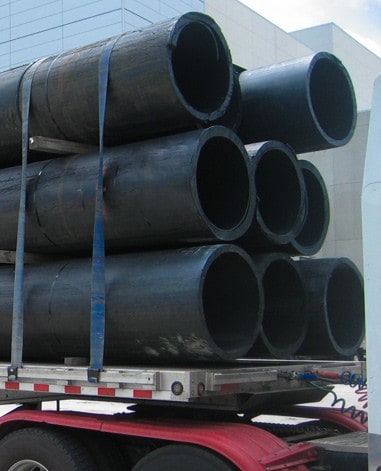Recognizing the Key Advantages of HDPE Pipeline for Water and Wastewater Management
The usage of HDPE pipe in water and wastewater management presents countless benefits that merit factor to consider. Its exceptional resilience and long life-span make it a recommended selection for several jobs. Furthermore, the material's resistance to corrosion and chemical damages enhances its integrity in numerous settings. The benefits extend past just longevity and resistance. hdpe pipe in stock Midland TX. Exploring its cost-effectiveness and environmental effect exposes also much more compelling factors for its extensive fostering in modern facilities
Phenomenal Durability and Longevity

HDPE pipeline attracts attention for its exceptional toughness and long life, making it a recommended choice in water monitoring systems. Created from high-density polyethylene, these pipelines can hold up against substantial pressure and tension, making sure dependable performance gradually. Their robust nature allows them to withstand extreme ecological problems, including temperature changes and soil movements, which can create other products to fall short.
The life expectancy of HDPE pipelines often goes beyond 50 years, providing an economical option for municipalities and sectors alike. Additionally, the material's lightweight residential or commercial properties simplify installment, minimizing labor expenses and durations. This toughness lessens the need for constant fixings or replacements, even more enhancing its economic charm.
In water monitoring applications, the reliability of HDPE pipelines indicates less disturbances and enhanced service connection, making them integral to sustainable facilities development. The mix of durability and longevity solidifies HDPE's duty as a keystone in reliable water administration solutions.
_-_Post_di_Facebook_-_Dimensioni_personalizzate_(1)_60cafdf20856f.png)
Resistance to Rust and Chemical Damages
While numerous products catch corrosion and chemical damage with time, HDPE pipelines show exceptional resistance, making them optimal for numerous water monitoring applications. This durability originates from the molecular framework of high-density polyethylene, which is inherently non-reactive and does not wear away like steels or degrade from exposure to severe chemicals. Consequently, HDPE is very reliable in atmospheres with hostile materials, such as wastewater systems that might include acids, bases, and natural solvents.
Additionally, HDPE pipelines can endure environmental aspects such as soil acidity and saline conditions, better enhancing their suitability for varied applications (Midland TX HDPE Pipe Fittings in Stock). Their ability to preserve architectural integrity gradually lowers the risk of leaks and failings, which is important in making sure the safety and dependability of water circulation and wastewater monitoring systems. The resistance to corrosion and chemical damages substantially adds to the overall performance and longevity of HDPE piping options.
Cost-Effectiveness and Economic Benefits
When thinking about the economic effects of water management systems, the cost-effectiveness of HDPE pipelines ends up being noticeable. These pipelines use reduced installation and maintenance expenses compared to standard materials like steel or concrete. Their light-weight nature simplifies transport and installment, resulting in reduced labor expenditures. Furthermore, HDPE pipelines show a lengthy life expectancy, commonly exceeding 50 years, which translates to fewer replacements and long-lasting cost savings.
The resistance of HDPE to deterioration and chemical damage lessens the requirement for expensive repair work and replacements. The pipelines additionally support reliable water circulation, reducing energy costs related to pumping systems. By reducing leaks and water loss, HDPE pipes add to considerable economic benefits for towns and markets alike. Overall, the preliminary investment in HDPE piping can generate substantial monetary returns over the lifespan of the water management system, making it a prudent option for sustainable framework advancement.
Ecological Sustainability and Lowered Influence

Versatility and Adaptability in Installment
Due to their unique properties, HDPE pipes provide amazing adaptability and flexibility in installment, making them suitable for a large range of applications. Their lightweight nature permits for simpler handling and transportation, minimizing labor expenses and setup time. HDPE pipes can be curved and formed to fit numerous terrains and task needs, which is specifically helpful in challenging settings.
Furthermore, their resistance to rust and chemical damage permits installation in varied setups without the need for specialized safety finishes. The ability to fuse joints creates a website continual, leak-free system, enhancing the total integrity and integrity of the setup. HDPE's flexibility additionally accommodates ground motion, decreasing the danger of damages in areas prone to shifting dirt. Overall, these characteristics make HDPE pipelines not just flexible however also a recommended choice for water and wastewater administration systems.
Regularly Asked Concerns
How Does HDPE Pipeline Contrast to PVC in Water Management Applications?
HDPE pipeline offers remarkable flexibility, resistance to rust, and resilience compared to PVC. Its lighter weight helps with less complicated setup, while its long lifespan decreases substitute expenses, making HDPE a preferred selection in water management applications.
What Is the Lifespan of HDPE Pipes Under Typical Problems?
Under normal conditions, HDPE pipelines can have a life expectancy ranging from 50 to 100 years. Their resilience and resistance to rust add to their lasting efficiency in various applications, making them a reputable choice for framework.
Are HDPE Water Lines Recyclable After Their Service Life?
Yes, HDPE pipelines are recyclable after their service life. Texas hdpe pipe manufacturer. They can be refined and repurposed into brand-new products, considerably reducing ecological impact and advertising sustainability within the industry, making them a green choice for piping remedies
What Is the Installation Refine for HDPE Piping?
The setup procedure for HDPE pipelines involves site prep work, trenching, pipeline fusion or mechanical signing up with, backfilling, and stress screening. Proper methods assure a durable and effective system for moving water and wastewater efficiently.
Can HDPE Water Lines Be Made Use Of for Both Potable and Non-Potable Water Solutions?
Yes, HDPE pipelines can be made use of for both potable and non-potable water systems. Their adaptability, longevity, and resistance to corrosion make them suitable for different applications, making sure secure and reliable transport of water in different contexts.